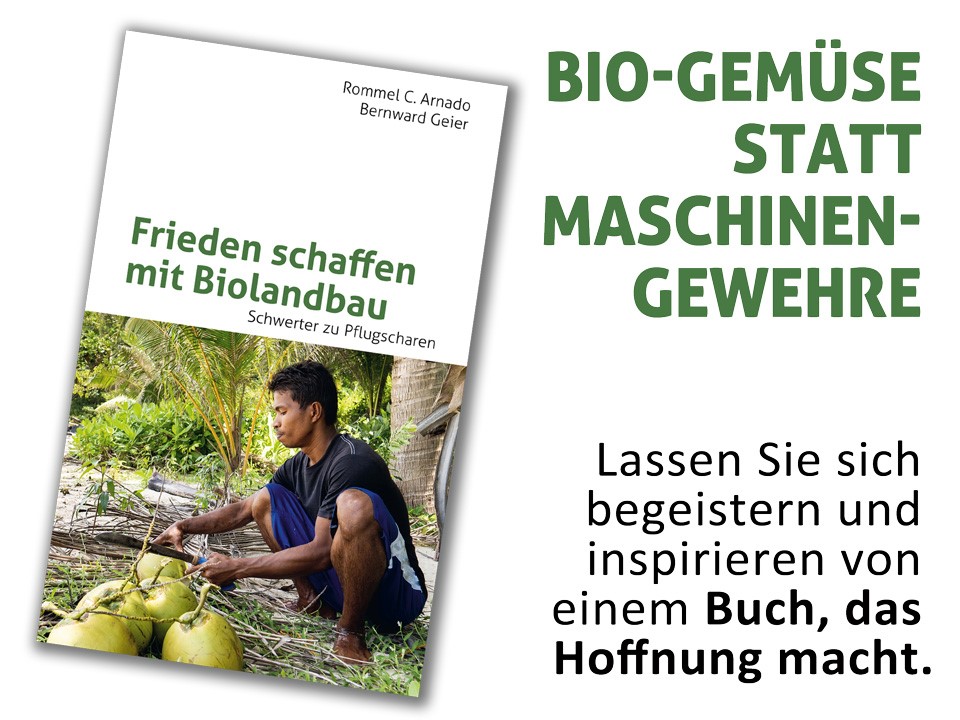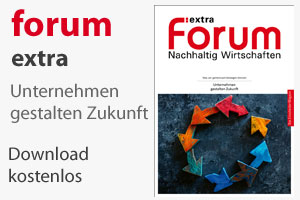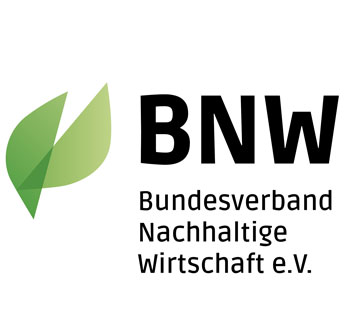COP29 Leaders Convene to Advance Regenerative Agriculture Innovations as Climate Solutions
Final comment of NOW Partners to the second week of COP29
Future Economy Forum, NOW Partners Foundation, and Food Tank, in partnership with IICA, Unilever, Natural Capitalism Solutions, Sekem, and Imaflora, hosted a dynamic dinner series throughout weeks one and two at COP29 in Baku, bringing together high-level leaders from across sectors to advance solutions to the climate crisis using regenerative agriculture and land use. The event fostered collaboration and knowledge sharing among farmers, food producers, journalists, policymakers, industry, Ministers of Agriculture, and civil society.
Key themes that emerged from the week:
- Regenerative Agriculture presents a proven and viable solution to global polycrises including: climate change, food insecurity, soil degradation, forced migration & biodiversity collapse.
- Fair compensation for smallholder farmers via models such as EoL’s whole system carbon credits present market-based solutions to channel financing where it is needed.
- Climate solutions can be implemented profitably and effectively to incentivize industry level shifts. Business success & regeneration of people & planet can be mutually beneficial.
- Community models are essential to the success of rapid scaling of climate solutions, as exemplified in the well documented successes of Andhra Pradesh Community-managed Natural Farming (APCNF). This effectively sequesters carbon & regenerates soil while delivering food security and lifting farmers from poverty.
- Multistakeholder dialogue, cross-sectoral collaboration & organizational partnerships are essential for the shared learning & action required for systemic change.
At the Scaling Regenerative Agriculture Innovations Dinner Series, the Future Economy Forum welcomed speakers and dialogue participants from over 55 countries and representing more than 490 organizations.
Some highlights:
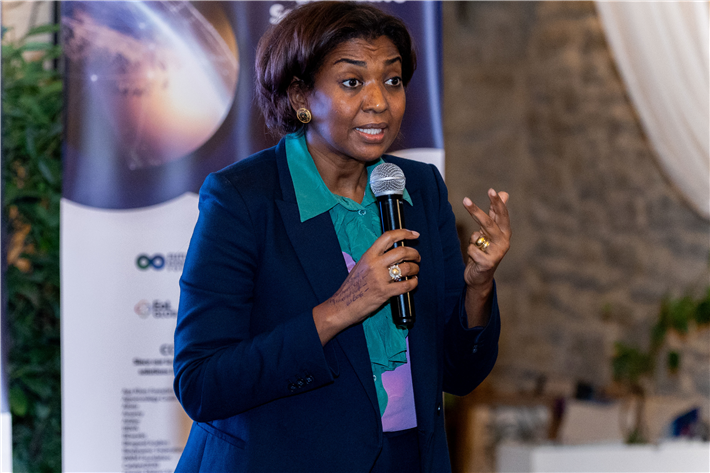 Rania Dagash-Kamara © Future Economy Forum
Rania Dagash-Kamara © Future Economy ForumSusan Chomba of World Resources Institute (WRI), shared her story of being raised by her mother and grandmother who were farmers, and whose wisdom and resourcefulness put her through college. She emphasized the importance of valuing the ingenuity and intelligence of farmers - and how essential it is to develop agricultural innovations and solutions WITH the communities in partnership, rather than as a recipient of interventions.
H.E. Paulo Teixeira, Minister for Agrarian Development and Family Farming of Brazil
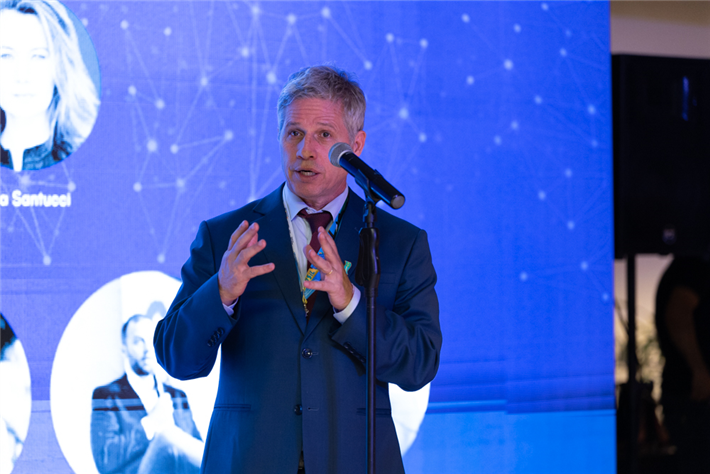 Paulo Teixeira © Future Economy Forum
Paulo Teixeira © Future Economy ForumH.E. Rania Al-Mashat, Minister of Planning, Economic Development and International Cooperation, Egypt
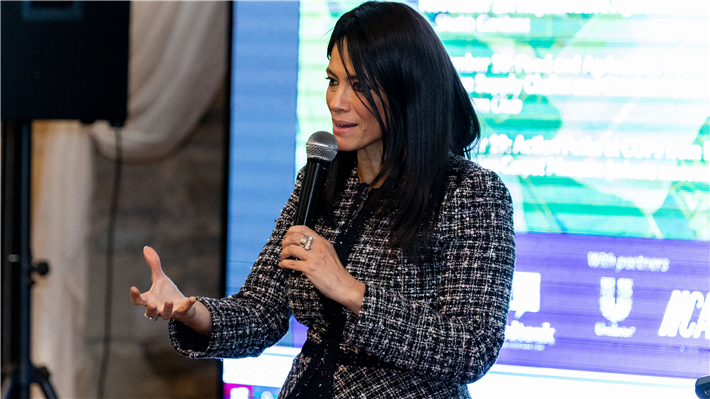 Rania Al-Mashat © Future Economy Forum
Rania Al-Mashat © Future Economy ForumH.E. Hailemariam Dessalegn, Former Prime Minister of Ethiopia and chair of AGRA commented "85% percentage of agriculture and food system is driven by small holder farmers in Africa. Regeneration is essential, our people understand what it could mean in their own lives and practices. But there is a knowledge gap that has to be addressed with methods.”
Hunter Lovins, NOW Partners Foundation, spoke: "In the 30 years we’ve been doing this, emissions have doubled. Whatever we’re doing at these events, it’s not working. And we’re running out of time. We have the solutions to the climate crisis. One: You stop emitting. Two: you take the excess carbon out of the atmosphere and put it where it belongs - back in the soil. There are thirty plus words for this, but what regenerative agriculture means: the soil is getting healthier.”
Incorporating Farmer Perspectives
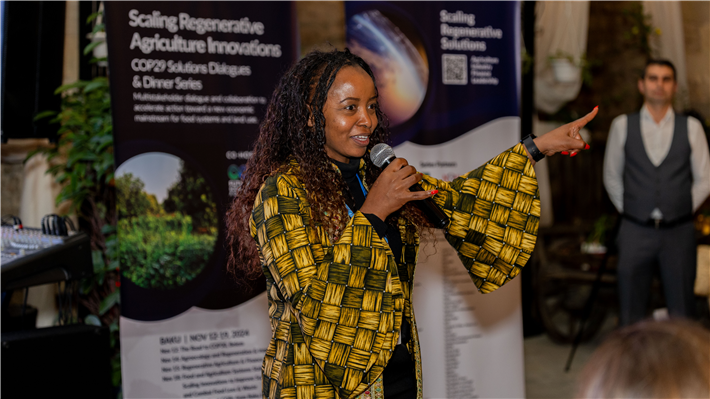 Susan Chomba, World Resources Institute (WRI) © Future Economy Forum
Susan Chomba, World Resources Institute (WRI) © Future Economy ForumHelmy Abouleish, Sekem, shared: "While we explore transformative solutions to reshape our lives and tackle global challenges that may seem "impossible”, at SEKEM Group, we understand how to embrace this notion of the "impossible.” Through the Economy of Love standard, we introduce models that incentivize environmental initiatives. These efforts not only aim to mitigate climate change but also to establish sustainable food systems and uplift rural communities facing significant hardships.”
Thoraya Seada, of Heliopolis University commented, "Carbon Credits are tools, not targets. Exploring the critical roles that Voluntary Carbon Markets (VCM) must play in facing the climate change crisis is essential. By fostering credible carbon credit mechanisms, VCM can incentivize sustainable practices, enhance climate resilience, and create a pathway for transformative solutions.”
"We're not always going to agree, but it's important that we're able to converse like this and tell our story," shared Lloyd Day of Inter-American Institute for Cooperation on Agriculture (IICA). "Regenerative agriculture is very important, and we are spending a lot of time investing in soil-centered agriculture; we find it important to work through the COP process and we're glad to be here."
Unilever representative Thomas Lingard added, "Look how much work has been done by the organizations present here today to really put food and agriculture at the center of the conversation. I believe that we're going to see many changes, such as governments stepping up with subsidy reform and more convergence in measurement reporting frameworks, so we spend less time discussing spreadsheets and more time driving impact."
The Importance of Collaboration for Food System and Land Use Solutions
Eric Mittenhal of IICA emphasized the need for cross-sector collaboration: "In agriculture, we often talk to ourselves in bubbles, and we need to reach across organizations toward common goals in a data-driven way. No one company, no one country, no one industry can really solve this. So we have to look across our supply chains, around the world, to help advance agricultural sustainability solutions."
Vincent Martin of FAO highlighted the importance of partnerships and farmer-led innovation: "We have to move away from having trials here and there. We want to transform food systems. So we have to work together. We work with peer-to-peer learning programs, where farmers learn from their mistakes and from each other. We believe in the innovative potential of farmers."
Climate Change, Food Security and Resilience
Hon. Jose Abelardo Mai, Minister of Agriculture of Belize, emphasized the connection between climate change and food security, stating, "When you grow your own food, it's like you are printing your own money. Climate change is real and puts us at risk of food security."
Hon. Roland Royer, Minister of Agriculture, Fisheries, Blue & Green Economy of Dominica, shared his country's commitment to resilience in the face of climate change: "We are working towards being resilient. We have a small population, but we are a food basket for the eastern Caribbean states. The problem we are facing is with dangerous storms; we faced destructive tropical storms and hurricanes in 2015 and 2017. At this point, our Prime Minister made the goal that Dominica will become the most resilient country in the world. We are here to discuss, get information, and learn about climate solutions."
This solutions-focused dialogue at COP29 demonstrated the power of collaboration and knowledge sharing among diverse stakeholders in driving the transition towards regenerative agriculture and land use practices.
Creating an Arc of Transition
"COP29 is the Finance COP," said Merijn Dols. "It's easy for finance to be dehumanizing and just about numbers, and the Global North and Global South. Here today, we can remember the human stories, and consider how we can use dialogue to re-humanize finance. These are not just singular events – it is, ‘are we building an arc of transition, across also the various COPs, the various meetings throughout the year?’"
HH Princess Mashael bint Saud AlShalan, co-founder of Aeon Collective, commented on goals for action at the UNCCD’s COP16, "In the COP16 Green Zone, a zone that is open for the public, we are establishing a People’s pavilion. At its core, it is a simple resolution for everyone who is contributing to it. You are welcome to do…. We are part of a much bigger boat, and when we are safe within our territories, we have to pay service to other species that we live with. Don’t just talk, do something.”
COP30: A People-Centered COP
Alberto Kleiman, Director of Institutional Relations and Partnerships for Brazil’s COP30 Presidency, commented on the vision for next year’s climate conference, which will be convened in Belem, Brazil: "We are motivated to turn the COP30 vision to reality. People talk a lot about the Amazon, but few know it. We, the Brazilian government, invite people to be part of this historical process.” He continued, "We welcome the global community to visit Belem, not for tourism, but for the life changing experience of being there, to experience and learn the Amazon and know this important part of the planet. We see civil society participation in blue and green zones is key, it is one of the pillars of this COP."
Transforming Challenges into Opportunities
Angela Pinhati, Chief Sustainability Officer of the Brazil-based multinational, Natura, emphasized the opportunities for businesses in driving positive impact: "We at Natura transform social and environmental challenges into business opportunities. We have in mind the financial aspect of our business but together impacting positively the world and in this specific case, the Amazon rainforest. We contribute to keep 2.2 million hectares of standing forest. We prove that it is possible to have good business, healthy business with positive impact."
Dialogue for Action
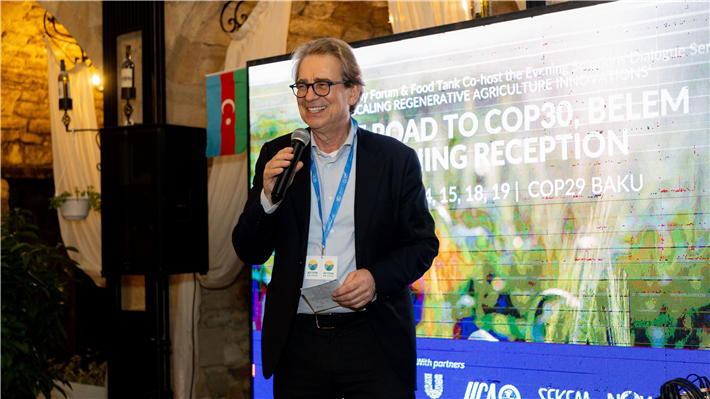 Walter Link, CEO of NOW Partners Foundation © Future Economy Forum
Walter Link, CEO of NOW Partners Foundation © Future Economy ForumDialogue participants included Rushank Bardolia, leading Green Earth Agro that supports smallholder regenerative agriculture in Ghana.
See also: forum special entry on COP29 - A collection of reports and comments by forum correspondents
Unter "Der aktuelle Kommentar" stellen wir die Meinung engagierter Zeitgenossen vor und möchten damit unserer Rolle als forum zur gewaltfreien Begegnung unterschiedlicher Meinungen gerecht werden. Die Kommentare spiegeln deshalb nicht zwingend die Meinung der Redaktion wider, sondern laden ein zur Diskussion, Meinungsbildung und persönlichem Engagement. Wenn auch Sie einen Kommentar einbringen oder erwidern wollen, schreiben Sie an kommentar@forum-csr.net.
Quelle: NOW Partners Foundation
Umwelt | Klima, 19.11.2024
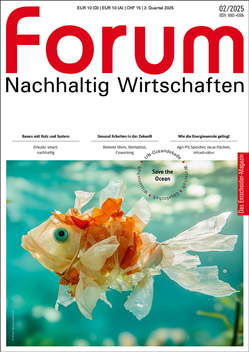
Save the Ocean
forum 02/2025 ist erschienen
- Regenerativ
- Coworkation
- Klimadiesel
- Kreislaufwirtschaft
Kaufen...
Abonnieren...
30
APR
2025
APR
2025
Franz Alt: Die Solare Weltrevolution - Aufbruch in eine neue Menschheitsepoche
In der Reihe "Mein Klima… in München"
80331 München und online
In der Reihe "Mein Klima… in München"
80331 München und online
07
MAI
2025
MAI
2025
MakerCamp Genossenschaften 2025
Genossenschaftliche Lösungen in Wirtschaft, Kommunen und Gesellschaft
65189 Wiesbaden
Genossenschaftliche Lösungen in Wirtschaft, Kommunen und Gesellschaft
65189 Wiesbaden
14
MAI
2025
MAI
2025
Klimaschutz im peruanischen Regenwald
Delegierte der Asháninka teilen ihre Perspektiven
80802 München, Seidlvilla
Delegierte der Asháninka teilen ihre Perspektiven
80802 München, Seidlvilla
29
JUN
2025
JUN
2025
Constellations Week 2025 in Südtirol
Inspiration, Klarheit und Empowerment
I-39010 Tisens-Prissian, Südtirol
Inspiration, Klarheit und Empowerment
I-39010 Tisens-Prissian, Südtirol
Professionelle Klimabilanz, einfach selbst gemacht

Einfache Klimabilanzierung und glaubhafte Nachhaltigkeitskommunikation gemäß GHG-Protocol
Digitalisierung
Christoph Quarch empfiehlt allen seriösen Kräften den Rückzug von X
Jetzt auf forum:
Porsche investiert entschlossen in die Zukunft
16 Steps Initiative | Für eine klimaneutrale Veranstaltungswirtschaft
Nachhaltige Mobilität im Personen- und Güterverkehr - Quo Vadis?
Diskurse und geballtes Energiewissen im Rahmenprogramm
Der Einfluss von Digitalisierung auf nachhaltige Geschäftsmodelle


